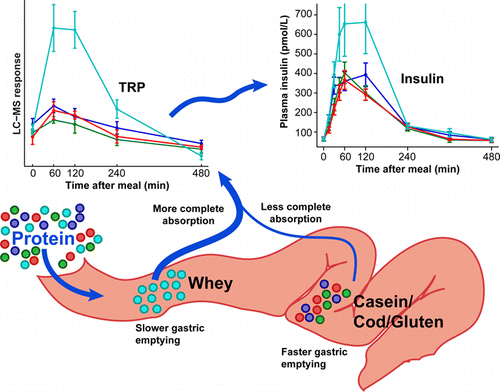New evidence shores up findings that whey protein, which is found in milk and cheese, could have health benefits for people who are obese and do not yet have diabetes. The study, which appears in ACS' Journal of Proteome Research, examined how different protein sources affect metabolism.
Lars O. Dragsted, Kjeld Hermansen and colleagues point out that obesity continues to be a major public health problem worldwide. In the U.S. alone, about 35 percent of adults and about 17 percent of children are obese, a condition that can lead to a number of health issues, including cardiovascular disease and type-2 diabetes. One risk factor for cardiovascular disease in people who are obese is high levels of fat in their blood after meals. But recent research has found that these levels partly depend on the kind of protein included in the meal. Studies have suggested that whey protein can lower the amount of fat and increase insulin, which clears glucose in the blood, keeping sugar levels where they're supposed to be. But the details on whey's effects were still vague, so the team took a closer look.
They gave volunteers who were obese and non-diabetic the same meal of soup and bread plus one kind of protein, either from whey, gluten, casein (another milk protein) or cod. The scientists found that the meal supplemented with whey caused the subjects' stomachs to empty slower than the others'. These subjects also had lower levels of fatty acids in their blood after meals but higher amounts of the specific types of amino acids that boost insulin levels.
More information: Whey Protein Delays Gastric Emptying and Suppresses Plasma Fatty Acids and Their Metabolites Compared to Casein, Gluten, and Fish Protein, J. Proteome Res., Article ASAP. DOI: 10.1021/pr401214w
Abstract
Whey protein has been demonstrated to improve fasting lipid and insulin response in overweight and obese individuals. To establish new hypotheses for this effect and to investigate the impact of stomach emptying, we compared plasma profiles after intake of whey isolate (WI), casein, gluten (GLU), and cod (COD). Obese, nondiabetic subjects were included in the randomized, blinded, crossover meal study. Subjects ingested a high fat meal containing one of the four protein sources. Plasma samples were collected at five time points and metabolites analyzed using LC-Q-TOF-MS. In contrast to previous studies, the WI meal caused a decreased rate of gastric emptying compared to the other test meals. The WI meal also caused elevated levels of a number of amino acids, possibly stimulating insulin release leading to reduced plasma glucose. The WI meal also caused decreased levels of a number of fatty acids, while the GLU meal caused elevated levels of a number of unidentified hydroxy fatty acids and dicarboxylic fatty acids. Also reported are a number of markers of fish intake unique to the COD meal.
Journal information: Journal of Proteome Research
Provided by American Chemical Society



















